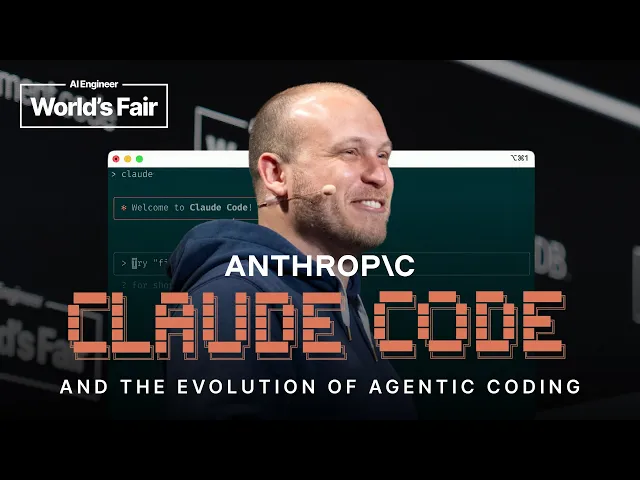Claude Code & the evolution of agentic coding

Claude & AI code agents will reshape development
In the rapidly evolving landscape of artificial intelligence, few developments have captured the imagination of software engineers quite like agentic coding assistants. Boris Cherny's enlightening discussion on Claude Code and the evolution of agentic coding offers a fascinating glimpse into how AI is transforming software development from a manual craft into a collaborative partnership between humans and machines. As coding assistants transition from passive autocomplete tools to proactive agents capable of understanding complex problems and generating entire systems, we stand at the precipice of a fundamental shift in how software gets built.
Key Points
-
The evolution of AI coding tools has progressed from simple autocomplete functionality to increasingly capable agents that can understand requirements and generate entire codebases with minimal human intervention.
-
Claude Code represents a significant advancement in agentic coding by building a mental model of what developers are trying to accomplish, allowing it to reason about code rather than just pattern match.
-
The future of development will likely involve humans focusing on high-level direction and quality control while AI agents handle implementation details, fundamentally changing the developer workflow.
The Rise of True AI Coding Agents
The most compelling insight from Cherny's presentation is how fundamentally different true AI coding agents are from traditional autocomplete tools. While earlier systems like Copilot began as sophisticated autocomplete, they essentially performed pattern matching against training data. What makes Claude Code and similar advanced systems revolutionary is their ability to build a mental model of what developers are trying to accomplish.
This represents a paradigm shift in AI-assisted development. Rather than simply predicting the next token based on statistical patterns, these systems can reason about code structure, understand architectural implications, and generate solutions that align with the developer's intent. As Cherny points out, this capability allows Claude Code to function more like a junior engineer who understands the context and goals of a project rather than just a mechanical code generator.
This matters tremendously for the industry because it addresses one of the fundamental limitations of previous generations of coding assistants: their inability to truly understand what they were generating. When AI can reason about code rather than just pattern match, it can catch logical errors, suggest architectural improvements, and even question requirements when they seem contradictory or incomplete.
Beyond The Video: Real-World Applications Already Emerging
What Cherny's presentation doesn't fully explore is how
Recent Videos
How To Earn MONEY With Images (No Bullsh*t)
Smart earnings from your image collection In today's digital economy, passive income streams have become increasingly accessible to creators with various skill sets. A recent YouTube video cuts through the hype to explore legitimate ways photographers, designers, and even casual smartphone users can monetize their image collections. The strategies outlined don't rely on unrealistic promises or complicated schemes—instead, they focus on established marketplaces with proven revenue potential for image creators. Key Points Stock photography platforms like Shutterstock, Adobe Stock, and Getty Images remain viable income sources when you understand their specific requirements and optimize your submissions accordingly. Specialized marketplaces focusing...
Oct 3, 2025New SHAPE SHIFTING AI Robot Is Freaking People Out
Liquid robots will change everything In the quiet labs of Carnegie Mellon University, scientists have created something that feels plucked from science fiction—a magnetic slime robot that can transform between liquid and solid states, slipping through tight spaces before reassembling on the other side. This technology, showcased in a recent YouTube video, represents a significant leap beyond traditional robotics into a realm where machines mimic not just animal movements, but their fundamental physical properties. While the internet might be buzzing with dystopian concerns about "shape-shifting terminators," the reality offers far more promising applications that could revolutionize medicine, rescue operations, and...
Oct 3, 2025How To Do Homeless AI Tiktok Trend (Tiktok Homeless AI Tutorial)
AI homeless trend raises ethical concerns In an era where social media trends evolve faster than we can comprehend them, TikTok's "homeless AI" trend has sparked both creative engagement and serious ethical questions. The trend, which involves using AI to transform ordinary photos into images depicting homelessness, has rapidly gained traction across the platform, with creators eagerly jumping on board to showcase their digital transformations. While the technical process is relatively straightforward, the implications of digitally "becoming homeless" for entertainment deserve careful consideration. The video tutorial provides a step-by-step guide on creating these AI-generated images, explaining how users can transform...
